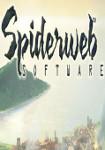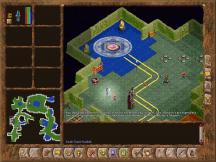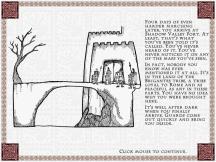Jeff Vogel Interview
"Spiderweb Games" is synonymous with indie CRPGs and while bigger studios close their doors, consolidate or diversify, Jeff Vogel has stayed true to his origins. Mind you, despite that conservative approach he doesn't mind giving the industry (and himself) a serve in his irregular column at RPG Vault. With Nethergate: Resurrection in beta testing for Windows and Avernum 5 officially announced last week, we catch up with Jeff to discuss all these items.
RPGWatch: The last time we spoke to you Avernum 4 was selling well and Geneforge 4 was on the horizon. How are they both travelling?
Jeff Vogel: We have had a very good run lately, sales-wise. Avernum 4 is still doing very well. Geneforge 4: Rebellion has had an extremely strong start and is easily the best selling of the Geneforge games.
We put a ton of work into Geneforge 4: Rebellion, improving the interface, the graphics, and the storyline, and it paid off. It’s still a surprise, though. I didn’t think a game with a really intricate plot could do that well. I’m happy to be proven wrong.
RPGWatch: Before we talk about your upcoming projects, I’ve got to ask about some of the comments you’ve made in your RPG Vault column. Your last Why I Hate Fantasy RPGs piece created quite a bit of debate, with some disagreement over what you really meant. I take it to be a bit tongue-in-cheek but let’s clarify some things. Were you seriously railing against any character progression, wanting to see RPGs transformed into action games or were you giving the industry (including yourself) a prod about mundane content design?
Jeff Vogel: Mainly the third one. I think that game developers need to be far, far more respectful of the time of the player. Leisure time is precious. We should not waste it. We shouldn’t burn time at the beginning making the player grind out levels before he or she can get into the plot. We shouldn’t burn time with faction grinding and trash clearing. We shouldn’t pad the game out with tons of B material.
Part of the reason I wrote those articles was to flog myself for my failures in the past. I’ve made mistakes. I’ve padded. I’ve wasted the time of the player. I want to get better.
And my time is much shorter now. I won’t play any game that wastes my time. God of War 2 gave me 13 hours of first rate material, and I was done. If a game doesn’t give me something like that, I’ll read a good book instead.
RPGWatch: And how do you reconcile your comments about “trash” monsters with your enjoyment of MMORPGs?
Jeff Vogel: I was an addict. It passed.
I spent an abusive amount of time playing Everquest. Then something happened. The switch flipped in my brain, and I didn’t care anymore. I was really looking forward to the World of Warcraft expansion coming out. Then it came out, and I just didn’t care.
I’ll really seriously have to need an escape from reality before I pick up an MMORPG again. The whole business model is based on keeping you playing for months and months. And, since content is finite and expensive, that means wasting my time.
Oh, and grinding faction is the dumbest thing ever.
RPGWatch: Do you have a role in addressing these issues within your own games? And what are the practical solutions?
Jeff Vogel: The solution is really simple. Think. Design better. Work harder. Instead of placing the same group of monsters, make something new. And, if you run out of time or resources, release a shorter game that has a higher respect for peoples’ time.
The problem, of course, that companies don’t have unlimited budgets or resources. But I would still prefer, given the choice between tedious filler and a shorter game, that they chose the second one.
RPGWatch: What can you do to keep each title fresh? There are obviously engine, graphical and gameplay similarities with most of your titles and you’ve done a number of remakes – is there a danger some players will simply switch off?
Jeff Vogel: I don’t expect someone to play every one of my games. I only have one brain. Every game has a bunch of new things, but it also has some things that are the same. Player very frequently take a break from my games for a year or three and then come back.
The main thing I do to keep titles fresh is to rework the engine to expand what I can design. Very often, the limits of the engine are what hold me back. With every new game, I increase the options available to me as a designer.
Also, I dramatically change the style of what I write. When I’m tired of doing games with in-depth plots and lots of dialogue, I do a hack and slasher.
RPGWatch: You recently released Blades of Exile to the community for open-source development. What do you hope will come of this?
Jeff Vogel: Blades of Exile was a huge success. It came with a powerful scenario design engine, and a big community sprung up around it. They designed many good scenarios, and I don’t want to see that work disappear.
The thing I hope most is that the engine gets modernized and works well on newer machines, so that more gamers can experience the creativity of the scenario designers.
RPGWatch: So, you’re next release is a remake of Nethergate, which has been released for Mac and is currently in beta testing for the PC version. Why Nethergate? Didn’t you write, with some frustration, that Nethergate didn’t sell very well when it was first released?
Jeff Vogel: Nethergate: Resurrection will be out for Windows this summer. We love this game. It has a unique game setting and design and many of the best ideas I’ve ever come up with. And, while it didn’t sell as well as we’d hoped, we went through our records and found that it did well enough to merit an update.
We’ve really polished it. Better interface, more dialogue, more dungeons, and all of the cool ides in it are still there. Even if it doesn’t sell a ton, I was happy to put a few months into it.
RPGWatch: For those that haven’t played Nethergate, tell us a little about it and what makes it special.
Jeff Vogel: Nethergate: Resurrection takes place in ancient England, which has been taken over by the Romans. It takes place in the valley of Shadowvale, where the last traces of magic remain in the world. The savage Celts are trying to master it to throw the Romans off their island. The Romans are trying to stop them. And you can play either side and see both sides of the story.
RPGWatch: Just how different is the story and gameplay for the two sides?
Jeff Vogel: Both sides see a completely different side of the story, so it’s like two games in one. What is a friendly town for the Celts is a hostile dungeon to the Romans. Each side has its own skills, advantages, and disadvantages.
Also, since you play both sides of the story, some really cool things happen. When you’re a Roman, something really weird might happen and you have no idea why. Then you’ll play as a Celt and find out that the weird thing happened because you did it.
It’s a really unique and fascinating game settings, but don’t worry about it being educational. There’s a lot of fun and action.
RPGWatch: What about those that did play the original? What will this remake offer them?
Jeff Vogel: A lot of things. New quests. Two large new dungeons, with their own mini-storyline. More characters, cutscenes, and dialogue. A lot of the major encounters have been rebalanced and rescripted to make them more interesting.
Plus, people who bought the original Nethergate get a big discount on Nethergate: Resurrection.
RPGWatch: I believe you are using the Blades of Avernum engine – why this engine and what are the pros and cons? Is there a danger using the BoA engine will homogenise Nethergate with Avernum but without offering, say, the improved resolution or animations of your latest two titles?
Jeff Vogel: It was a very tough call going with the older engine, but the truth is that it would have taken too long to adapt the game to the Avernum 4 or Geneforge engine. We’ll sacrifice some to adapt this game we love to the newer market, but there is a limit. It already took more time than we expected as it was.
But the Blades of Avernum engine is pretty good. It’s got a good and smooth interface and I really polished it for Nethergate: Resurrection. My main regret is that it can only support 800x600 resolution. But you can play the game in the window, which makes it nice for casual gamers.
RPGWatch: Now, you’re also working on Avernum 5 and I believe you recently finished the opening area. Avernum 5 has a more elaborate plot than the action-oriented A4, correct? Can you elaborate on this? Any hints to explain your recent comment that the starting position is “completely opposite”?
Jeff Vogel: The main selling point of Avernum 4 was that it had an insanely huge world, with hundreds of quests, piles of hidden dungeons, and many cool, scripted encounters. On the down side, it had a less involved plot. It was more of a hack and slash game. Avernum 5 will have a very neat and intricate plot. I’m really psyched about it.
For people who’ve never tried the Avernum series, Avernum is a nation in the underworld, inhabiting caves far below the surface of the world. The surface is ruled by the Empire, a monolithic power that controls everything. Once, Avernum was populated by convicts and misfits the Empire sent down there to rot. A big prison colony, basically.
In the first game, the players arrive and try to escape, or to get revenge on the Empire. The later games tell the story of the Avernites' struggle for survival and freedom.
Avernum 5 will be very different from all of the earlier games. You don't plan an Avernite. You play soldiers of the Empire for the first time, send down to the underworld to hunt down a madman who just tried to assassinate the Empress. That’s what I mean when I say that it’s an opposite position. You’re not the misfit cave dweller anymore. You’re supposedly one of the oppressors, dumped into this dark, alien environment full of paranoids and former rebels who hate you.
Meanwhile, you are looking for clues and trying to kill your enemy before he kills you. And he will try to kill you. A lot.
RPGWatch: The Battle Disciplines sound like an interesting addition…what can you reveal about them? What exactly are they and can you describe one as an example?
Jeff Vogel: It’s a fairly simple system. You get battle disciplines by training up your combat skills. You can use them in addition to your regular actions. When you use a discipline, you are “fatigued” for a certain number of turns, which means that you can’t use another discipline until it wears off. Some buff you, some damage or weaken foes, and so on.
Some of them are very good even for spell casters, like Adrenaline Rush, which gives you a huge one turn burst of action points. I think they will be good enough to tempt the non-combat characters to invest in melee weapons skills.
RPGWatch: I really liked the additional emphasis on scripted encounters in Geneforge 4. How did you see this turning out and will you be continuing this in future games?
Jeff Vogel: Man, it’s a lot of work. I spent days on some of the zones in Geneforge 4: Rebellion. But I love the result.
Scripted encounters with interesting, unpredictable elements really, really help a game. I’m working on Avernum 5 now, and I’m making cool events all over the place.
RPGWatch: Is there anything you’d like to add in closing?
Jeff Vogel: Just many thanks to the surprisingly large number of people who’ve been registering our games lately. Thank you for helping me to support my family. Your kindly supplied credit card numbers are the reason that Nethergate: Resurrection and Avernum 5 will exist.
Our thanks to Jeff for answering our questions and, as always, we'll keep you informed on everything Spiderweb.










